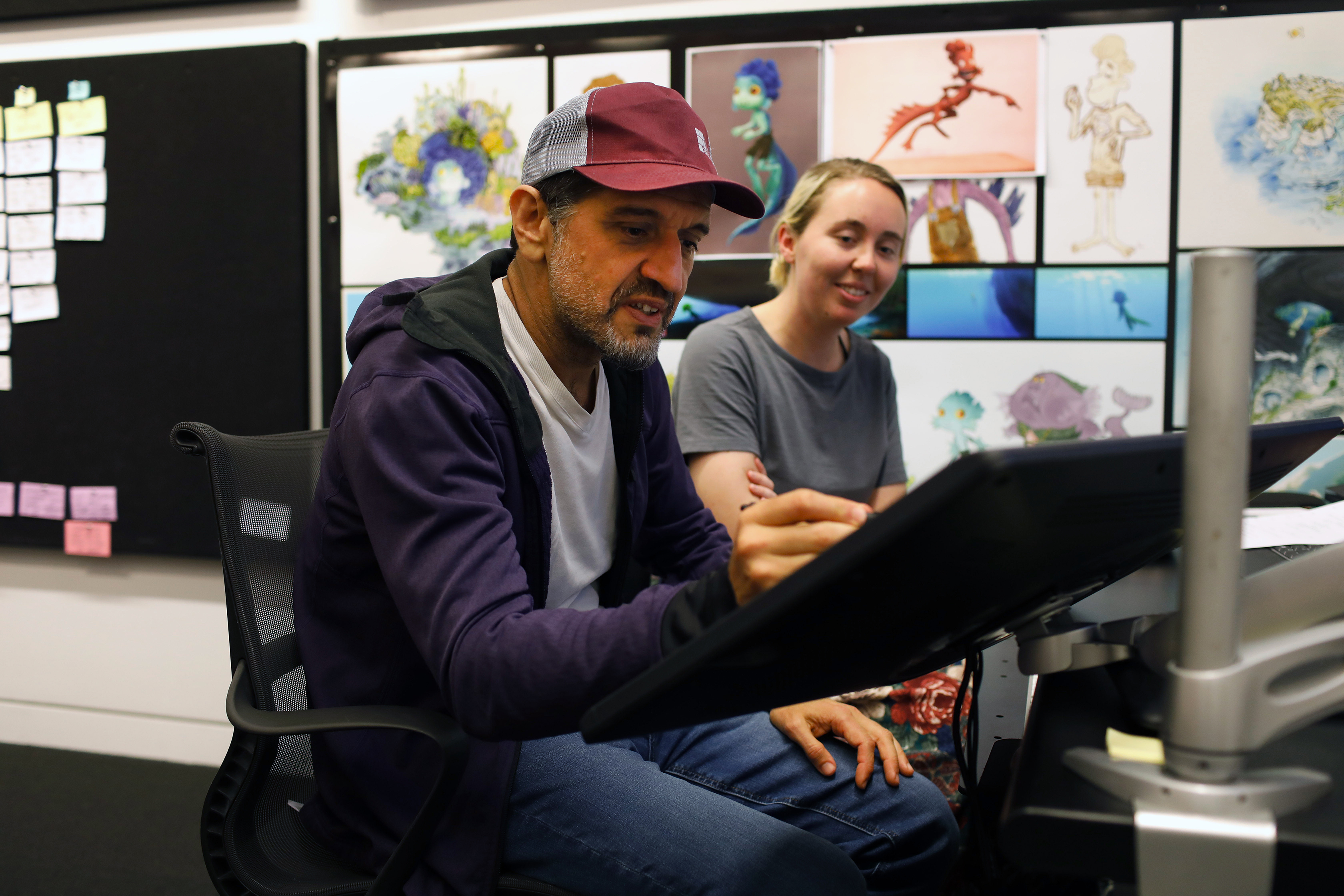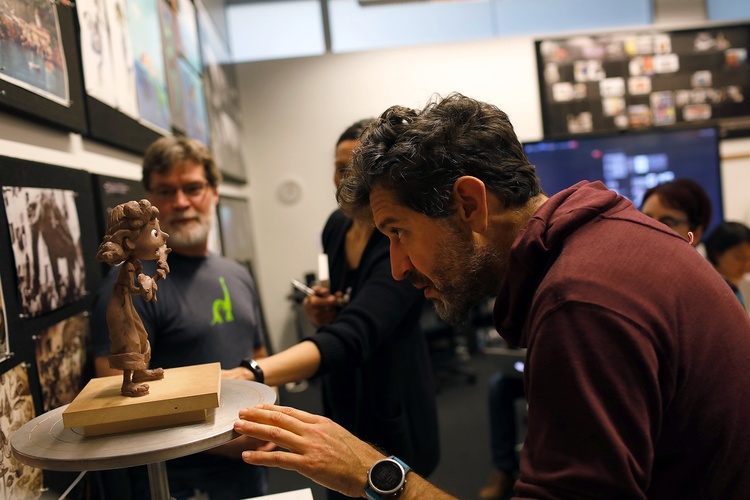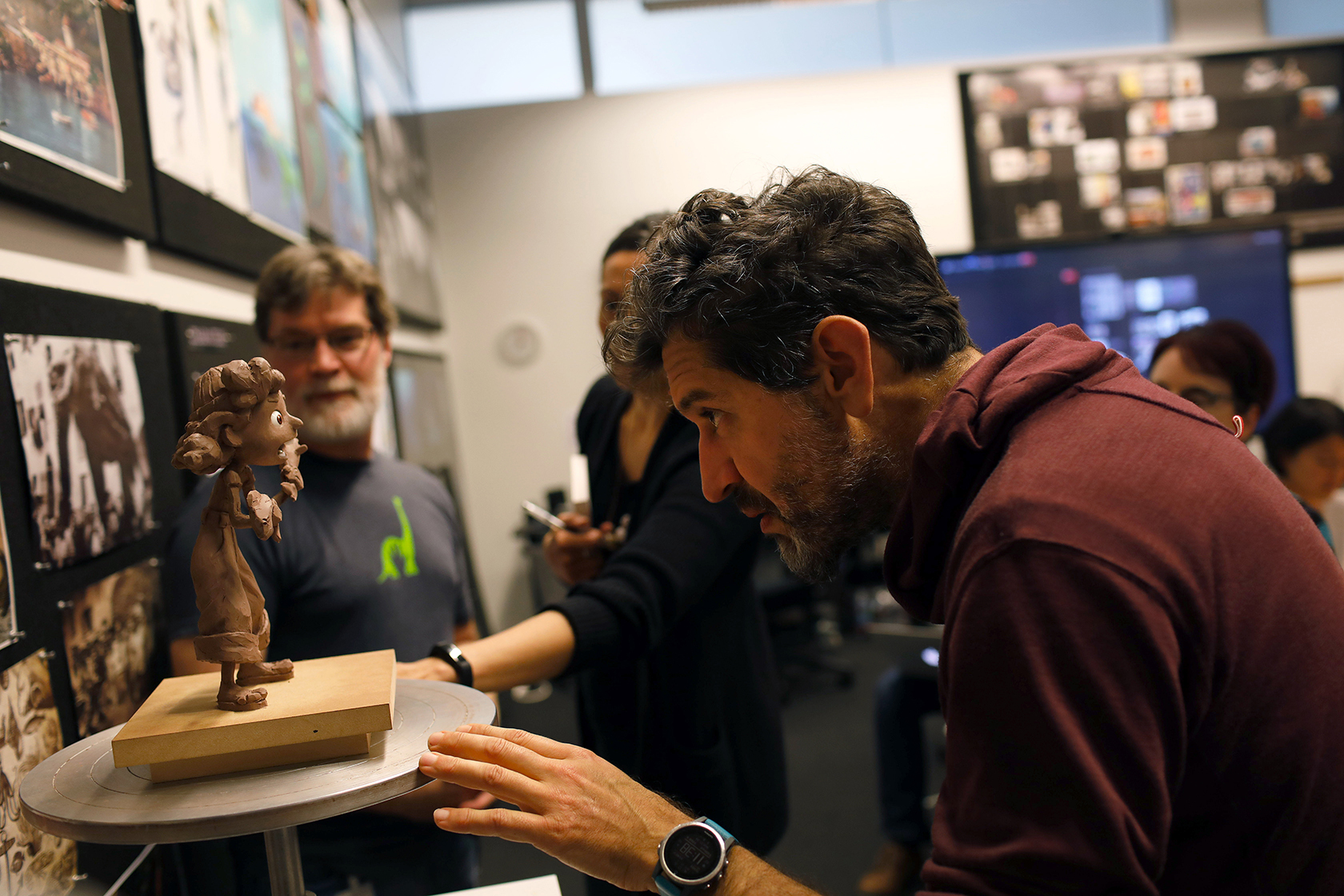His pencil has drawn those blissful yet sometimes reckless days, to create a modest, gentle story, aimed at the heart – as well as the taste buds.
Animation veteran and Pixar director Enrico Casarosa has imagined an ode to his beloved homeland, Liguria, with its lush landscapes, the dazzling clear blue sky and the orange glow of Riviera sunsets.
From the pastel houses tumbling down a hillside to the faded posters advertising La Strada and Roman Holiday, Italy seems frozen in time.
Somehow we find ourselves running through Vicolo De Sica and Piazza Calvino to the tune of Morandi’s Andavo a cento all’ora and Bennato’s Il gatto e la volpe.
A wide-eyed dreamer, Luca is entranced by what the “surface” has to offer, and his natural curiosity, as risky as it is exciting, finds similarities with the director’s own childhood.
“I left Italy at the age of 24 and eventually came to study animation in New York,” Casarosa says from his home in California, during our video interview.
“I enrolled in the Faculty of Engineering, but I immediately realised that it was not for me – I used to draw in my university books instead of studying.
“I then chose the European Institute of Design, but after putting my exams on hold for a while, I was forced to join the Italian Army as it was still mandatory.
“A year later, I flew to the United States.
“My father worked for Alitalia, so we had already been there on holiday a few times.
“I finally felt that that was my path.”
That child who adored watching Future Boy Conan and Miyazaki’s masterpieces had grown up and soon found himself, as a young adult, surrounded by the skyscrapers of the Big Apple with a folder of dreams and dozens worn-down pencils.
As an underdog – like the protagonists in Luca – he began to face the long days of a migrant, the rhythms of the School of Visual Arts and Illustration of the Fashion Institute of Technology in New York, the inevitable difficulties with obtaining visas, and the first working experiences in real animation studios.
“I’ve always felt like an outsider, different,” he says.
“During those early years, I had to do a lot more than those around me. I worked during the day and studied at night, but I must admit I learned a lot from those small studios.
“Many people have the ‘Pixar dream’, but it’s hard to aim so high right away; I have grown so much thanks to those first professional experiences.”

Director Enrico Casarosa in the Pixar studios. (Photo supplied)
Despite feeling homesickness, the joyful prospect of a raging future and an irrepressible vision justified going away, chasing a dream.
After eight years in New York, Casarosa had finally glimpsed his path, along the hundreds of thousands of steps that led him to Pixar Animation Studios.
He first started as a storyboard artist for Pixar successes Cars, Ratatouille and Up.
His own whimsical aesthetic infused La Luna (2012), his Oscar-nominated short.
He made his debut as a feature director with Luca to recount that distant sense of melancholy, the audacity that drove him to change his world and to tell a story about a special friend who led him where he never expected to arrive.
“Alberto is my best friend. We grew up together,” Casarosa says.
“I was very shy as a child; he was a free spirit – just like the main characters of the film.
“Nostalgia for our childhood is part of the story, as well as nostalgia for those friendships which make us discover ourselves.
“Alberto was the one who got me out of the bubble I was living in.
“In making Luca, I asked myself a question: ‘Would I be where I am now if I hadn’t grown up with, and learned from, that special friend?’.
“It is very important to have such great friends when we grow up.
“He was very bold and he is now a colonel in the Italian Air Force.
“It helped me a lot to talk with him during the filmmaking process – discussing how much we needed to each go our own way in order to find our place in the world.
“We met again last June for the presentation of the film in Genoa, our hometown; it was wonderful, it was like living another adventure.”
In Luca, you can easily get lost in the narrow streets of Portorosso – the name is the union of the Italian villages Portofino and Monterosso, both on the Ligurian coast – whilst facing the supernatural metamorphoses of the two protagonists, their genuine friendship and their shared passion for “the most beautifully designed Vespa”.
We can grow fond of little Giulia Marcovaldo with her hilarious Italian exclamations – “santa mozzarella!” – and her father Massimo, who “bears his disability with honour and strength”, thanks to Casarosa’s consultations with colleague Jim LeBrecht who directed the documentary Crip Camp: Revolutionary Disabilities.
So, too, the old ladies who eat gelato in the piazza, the children playing football and the beloved Machiavelli, the cat with a moustache, who “was created by chance at first, but whom we soon couldn’t get enough of”.
“There is a little fish named Enrico in the story; one of the writers [Jesse Andrews] used my name as a joke,” he says.
“‘Don’t be like Enrico!’, Luca’s mother exclaims, because Enrico has already gone away.
“He has left the sea and already reached the surface.
“It was a line that started as a joke that instead made me think, so I decided to leave it in the film.
“For Luca, as for me, the world needed to be discovered”.












